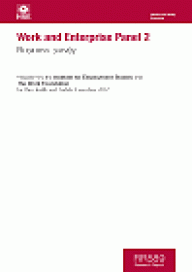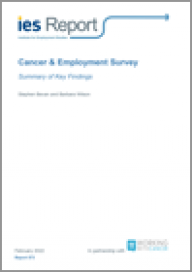Publications
 We author and publish a range of resources to keep you up to date with the latest developments in employment, labour market and human resource policy and practice.
We author and publish a range of resources to keep you up to date with the latest developments in employment, labour market and human resource policy and practice.
All our pdf publications are free to access.
Search results
-

Costing Sickness Absence in the UK
Bevan S, Hayday S | Sep 2001 | Institute for Employment StudiesDespite growing concern over sickness absence, organisations appear fundamentally ill equipped to form a comprehensive view of their absence costs. The most usual method of estimation uses only the basic salary of the absent employee, and neglects other significant aspects such as salary oncosts, overtime, payments to replacement workers, and all management costs from both line management or HR functions. This applies even to 'leading edge' UK employers who have the most sophisticated information systems.
-

Work and Enterprise Panel 2
Business Survey
Cowling M (IES), Bevan S (Work Foundation) | Sep 2007 | Health and Safety ExecutiveThis report provided information on UK business attitudes, intentions and performance relating to health and safety in the workplace in 2007. In addition, it provided robust empirical evidence concerning linkages and impacts of health and safety strategy and expenditure on an array of hard and soft performance measures of intermediate and final business performance.
-

Unlocking employee productivity: The role of health and wellbeing in manufacturing
May 2018 | EEF - The Manufacturers’ OrganisationIES-authored report for EEF, The Manufacturers' Organisation, and Westfield Health analyses the relationship between employee wellbeing and productivity in the manufacturing sector. The study offers guidance on how employee wellbeing activities can be aligned to business goals, based on a survey of over 100 employers and a review of the literature.
-

Cancer and employment survey
Summary of key findings
Bevan S, Wilson B | Feb 2022 | Institute for Employment Studies / Working with CancerIn this survey of over 1200 people living with cancer, we explore the factors which make a successful, sustainable and fulfilling return to work more likely, and consider the barriers which remain for those returning to work during or after treatment.
-

IES Working at Home Wellbeing Survey
Interim Findings
Bevan S, Mason B, Bajorek Z | Apr 2020 | Institute for Employment Studies (IES)Preliminary results from the first COVID-19 homeworker wellbeing study, looking at how working from home for an extended period is affecting the UK workforce.
-

The dopamine dividend: in the mood for employee happiness?
Bevan S | Nov 2021 | Institute for Employment StudiesThis paper looks at why emotion and mood at work has become such a commodity and explores the science behind the explosion of mood tracking apps.
-
📄
What Makes a Manager?
Hirsh W, Bevan S | Nov 1987 | Institute of Manpower StudiesThis publication is no longer available.
-

Realistic expectations? The role of the line in people management
IES event report: Mini-conference 21 May 2015
Tamkin P, Snowden E, Callen A, Brannon D | Aug 2015 | Institute for Employment StudiesThe mini-conference in May was a very successful event, with lots of positive feedback from members. We have written a full account of the day’s events, covering each presentation in detail.
-

Webinar: Work After Lockdown
Findings from the qualitative research with organisations and secondary data analysis
Apr 2022 | Institute for Employment StudiesEvent resources from the recent Work After Lockdown webinar.
-

Obesity stigma at work
Improving inclusion and productivity
Bajorek Z, Bevan S | Nov 2020 | Institute for Employment StudiesThis report is the first output of the PURPOSE programme (Promoting Understanding and Research into Productivity, Obesity Stigma and Employment). The programme, funded by Novo Nordisk, focusses on improving national productivity levels via better employment and labour market outcomes for those living with overweight or obesity.
